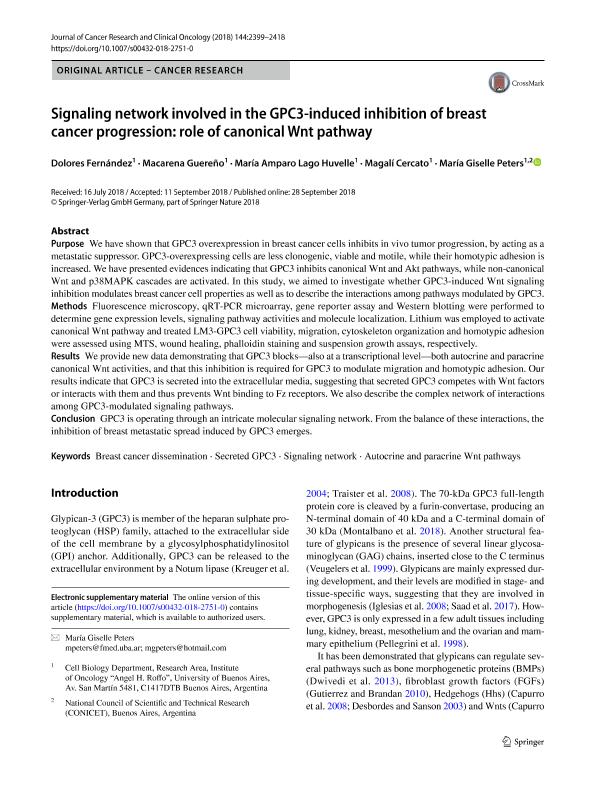Mostrar el registro sencillo del ítem
dc.contributor.author
Fernández, Dolores
dc.contributor.author
Guereño, Macarena
dc.contributor.author
Lago Huvelle, María Amparo

dc.contributor.author
Cercato, Magalí Cecilia

dc.contributor.author
Peters, María Giselle

dc.date.available
2019-12-30T06:38:32Z
dc.date.issued
2018-09
dc.identifier.citation
Fernández, Dolores; Guereño, Macarena; Lago Huvelle, María Amparo; Cercato, Magalí Cecilia; Peters, María Giselle; Signaling network involved in the GPC3-induced inhibition of breast cancer progression: role of canonical Wnt pathway; Springer; Journal Of Cancer Research And Clinical Oncology; 144; 12; 9-2018; 2399-2418
dc.identifier.issn
0171-5216
dc.identifier.uri
http://hdl.handle.net/11336/93198
dc.description.abstract
Purpose: We have shown that GPC3 overexpression in breast cancer cells inhibits in vivo tumor progression, by acting as a metastatic suppressor. GPC3-overexpressing cells are less clonogenic, viable and motile, while their homotypic adhesion is increased. We have presented evidences indicating that GPC3 inhibits canonical Wnt and Akt pathways, while non-canonical Wnt and p38MAPK cascades are activated. In this study, we aimed to investigate whether GPC3-induced Wnt signaling inhibition modulates breast cancer cell properties as well as to describe the interactions among pathways modulated by GPC3. Methods: Fluorescence microscopy, qRT-PCR microarray, gene reporter assay and Western blotting were performed to determine gene expression levels, signaling pathway activities and molecule localization. Lithium was employed to activate canonical Wnt pathway and treated LM3-GPC3 cell viability, migration, cytoskeleton organization and homotypic adhesion were assessed using MTS, wound healing, phalloidin staining and suspension growth assays, respectively. Results: We provide new data demonstrating that GPC3 blocks—also at a transcriptional level—both autocrine and paracrine canonical Wnt activities, and that this inhibition is required for GPC3 to modulate migration and homotypic adhesion. Our results indicate that GPC3 is secreted into the extracellular media, suggesting that secreted GPC3 competes with Wnt factors or interacts with them and thus prevents Wnt binding to Fz receptors. We also describe the complex network of interactions among GPC3-modulated signaling pathways. Conclusion: GPC3 is operating through an intricate molecular signaling network. From the balance of these interactions, the inhibition of breast metastatic spread induced by GPC3 emerges.
dc.format
application/pdf
dc.language.iso
eng
dc.publisher
Springer

dc.rights
info:eu-repo/semantics/openAccess
dc.rights.uri
https://creativecommons.org/licenses/by-nc-sa/2.5/ar/
dc.subject
Autocrine and paracrine Wnt pathways
dc.subject
Breast cancer dissemination
dc.subject
Secreted GPC3
dc.subject
Signaling network
dc.subject
Breast cancer dissemination
dc.subject.classification
Bioquímica y Biología Molecular

dc.subject.classification
Ciencias Biológicas

dc.subject.classification
CIENCIAS NATURALES Y EXACTAS

dc.subject.classification
Bioquímica y Biología Molecular

dc.subject.classification
Ciencias Biológicas

dc.subject.classification
CIENCIAS NATURALES Y EXACTAS

dc.title
Signaling network involved in the GPC3-induced inhibition of breast cancer progression: role of canonical Wnt pathway
dc.type
info:eu-repo/semantics/article
dc.type
info:ar-repo/semantics/artículo
dc.type
info:eu-repo/semantics/publishedVersion
dc.date.updated
2019-10-21T19:01:00Z
dc.journal.volume
144
dc.journal.number
12
dc.journal.pagination
2399-2418
dc.journal.pais
Alemania

dc.description.fil
Fil: Fernández, Dolores. Universidad de Buenos Aires. Facultad de Medicina. Instituto de Oncología; Argentina
dc.description.fil
Fil: Guereño, Macarena. Universidad de Buenos Aires. Facultad de Medicina. Instituto de Oncología; Argentina
dc.description.fil
Fil: Lago Huvelle, María Amparo. Universidad de Buenos Aires. Facultad de Medicina. Instituto de Oncología; Argentina. Consejo Nacional de Investigaciones Científicas y Técnicas; Argentina
dc.description.fil
Fil: Cercato, Magalí Cecilia. Consejo Nacional de Investigaciones Científicas y Técnicas; Argentina. Universidad de Buenos Aires. Facultad de Medicina. Instituto de Oncología; Argentina
dc.description.fil
Fil: Peters, María Giselle. Universidad de Buenos Aires. Facultad de Medicina. Instituto de Oncología; Argentina. Consejo Nacional de Investigaciones Científicas y Técnicas; Argentina
dc.journal.title
Journal Of Cancer Research And Clinical Oncology

dc.relation.alternativeid
info:eu-repo/semantics/altIdentifier/url/https://link.springer.com/article/10.1007%2Fs00432-018-2751-0
dc.relation.alternativeid
info:eu-repo/semantics/altIdentifier/doi/http://dx.doi.org/10.1007/s00432-018-2751-0
Archivos asociados
